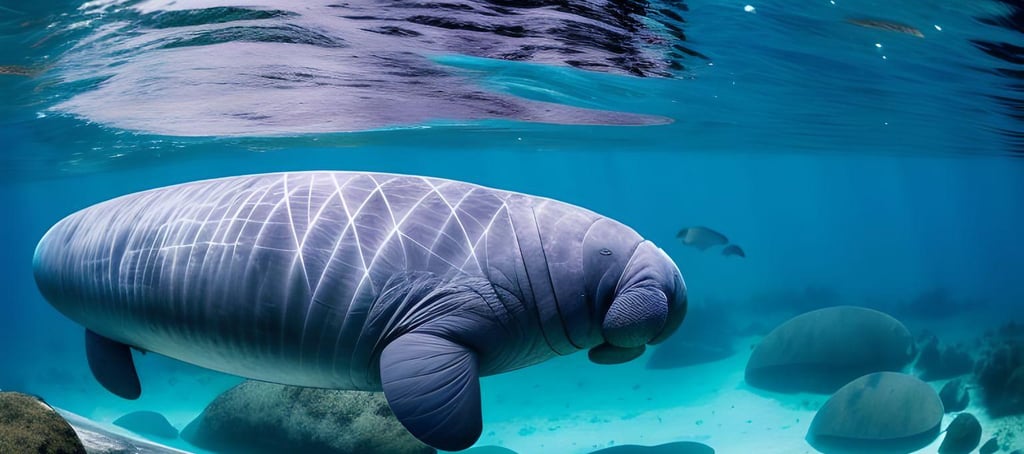Federal Judge And The Manatee Death Trial
In a landmark decision, a federal judge has dismissed Florida's attempt to halt the lawsuit related to increasing manatee deaths in the Indian River Lagoon. This ecologically rich estuary is vital for manatees, making this trial crucial for environmental conservation efforts.
In a significant development for environmental conservation, a federal judge has denied Florida's attempt to dismiss a lawsuit addressing the alarming rise in manatee deaths in the Indian River Lagoon. The lawsuit alleges that the Florida Department of Environmental Protection (FDEP) violated the Endangered Species Act (ESA), and U.S. District Judge Carlos Mendoza’s ruling has cleared the way for a trial to determine the state’s accountability.
Background: A Crisis in the Lagoon
The Indian River Lagoon, an ecologically rich estuary along Florida’s Atlantic coast, has long been a crucial habitat for manatees. In a significant step for environmental conservation, a federal judge has rejected Florida's motion to dismiss a lawsuit concerning the rise in manatee fatalities in the lagoon.
The lawsuit claims that the Florida Department of Environmental Protection (FDEP) violated the Endangered Species Act (ESA). U.S. District Judge Carlos Mendoza's decision allows for a trial to determine the state's responsibility in this issue. These gentle marine mammals, often called "sea cows," are listed as a threatened species under the ESA. However, the lagoon has suffered severe ecological degradation recently, with pollution from wastewater discharges, agricultural runoff, and urban development causing a drastic decline in water quality.
The primary victim of this environmental collapse has been seagrass, a vital food source for manatees. The loss of seagrass has had catastrophic consequences for the species, culminating in a record 1,100 manatee deaths across Florida in 2021. Brevard County, a focal point of the crisis, reported 358 deaths, the highest in the state. Many of these fatalities were attributed to starvation, underscoring the dire need for action.
The Lawsuit: Bear Warriors United vs. Florida DEP
The lawsuit, filed by the environmental advocacy group Bear Warriors United, accuses the FDEP of failing to enforce water quality standards in the Indian River Lagoon. The group argues that the agency’s inaction has allowed nutrient pollution to spiral out of control, fueling algal blooms that block sunlight and hinder seagrass growth.
In their complaint, Bear Warriors United contends that the state’s negligence violates the ESA, which mandates the protection of endangered and threatened species and their habitats. The group seeks a court order compelling the FDEP to implement stricter measures to curb pollution and restore the lagoon’s ecosystem.
Judge Mendoza’s Ruling
Last week, Judge Mendoza issued a 17-page order in favor of Bear Warriors United. He highlighted the group's arguments that wastewater discharges into the lagoon have contributed to the destruction of seagrass and, consequently, the deaths of manatees. He determined that the plaintiffs presented sufficient evidence to warrant a trial.
“The court finds that the plaintiffs have adequately demonstrated a connection between the state’s regulatory failures and the harm to manatees,” Mendoza wrote in his ruling. “A trial is necessary to resolve these critical issues and determine whether the Florida Department of Environmental Protection has violated the Endangered Species Act.”
The State’s Defense
The FDEP maintains that it is taking steps to address the lagoon’s ecological challenges. The agency cites ongoing initiatives to reduce nutrient pollution, including investments in wastewater infrastructure and stormwater management systems. State officials also argue that the manatee deaths result from complex environmental factors beyond their immediate control.
However, environmental advocates criticize these efforts as insufficient and poorly enforced. Bear Warriors United and other conservation groups contend that the state’s actions have failed to address the root causes of the crisis, leaving manatees and the lagoon’s ecosystem in peril.
A Broader Environmental Crisis
The plight of manatees in the Indian River Lagoon highlights a broader environmental crisis affecting Florida’s waterways. Nutrient pollution from human activities has caused widespread algal blooms in rivers, lakes, and estuaries across the state. These blooms devastate aquatic ecosystems and pose risks to public health and local economies.
The lagoon’s decline has drawn national attention, with environmentalists warning that losing such a vital ecosystem could have far-reaching consequences. The Indian River Lagoon is home to over 4,300 species of plants and animals, making it one of North America's most biodiverse estuaries. Protecting this fragile habitat is essential not only for manatees but also for the many other species that depend on it.
The Path Forward: What’s at Stake in the Trial
The upcoming trial will be a pivotal moment for environmental conservation in Florida. The case aims to determine if the state's regulatory framework sufficiently protects endangered species and their habitats. A ruling against the FDEP could set a powerful precedent, compelling state and local governments to adopt stricter environmental protections.
For manatees, the trial represents a chance to address the root causes of their suffering. Experts emphasize that restoring the lagoon’s seagrass beds is essential for the species’ survival. This will require a comprehensive approach to reducing nutrient pollution, including stricter regulations, enhanced enforcement, and increased funding for restoration projects.
Public and Political Response
The case has sparked widespread public interest, with many Floridians voicing support for stronger protections for manatees and the Indian River Lagoon. Conservation groups have organized rallies and awareness campaigns to draw attention to the issue, urging policymakers to prioritize environmental stewardship.
On the political front, the lawsuit has highlighted the need for greater collaboration between state and federal agencies. Environmental advocates argue that federal oversight is crucial to ensuring that Florida meets its obligations under the ESA. Some lawmakers have also called for increased federal funding to support restoration efforts in the lagoon.
The Role of Public Involvement
While the trial will play a crucial role in shaping the future of the Indian River Lagoon, experts stress that public involvement is equally important. Local communities, businesses, and individuals can contribute to conservation efforts by adopting sustainable practices and advocating for stronger environmental policies.
Educational initiatives can also help raise awareness about the lagoon’s ecological significance and the challenges it faces. By fostering a sense of stewardship, these efforts can inspire collective action to protect Florida’s natural heritage.
Conclusion
The decision to proceed to trial marks a crucial point in the effort to save Florida’s manatees and restore the Indian River Lagoon. As the case unfolds, it will test the state’s dedication to environmental conservation and its duty to protect endangered species. For manatees, the trial's outcome could determine their survival or continued decline. For Florida’s waterways, it offers a chance to tackle longstanding environmental issues and secure a healthier future for generations. The stakes are high, but so is the potential for meaningful change.





